QuestionQUESTION: I have a four-month-old neutered Vietnamese potbelly. He was very sweet when I first got him but he has become aloof - not lethargic, as he has lots of energy and a great appetite. He just doesn't seem excited to see me when I come home anymore. No more "hahas". He chews on the walls, and after I tell him "NO" and push on his shoulder, he wags his tail like he either doesn't understand or like it's a game. And of course, the head swiping has increased substantially.
I've read that single pigs can become spoiled easily, so I've decreased the doting affection I give to him, and increased training sessions and outside time/length of our twice-a-day walks to keep him mentally stimulated.
I'm waiting for my book by Priscilla Valentine to arrive. Anything you can do to help me in the meantime would be VERY appreciated!
Thank you.
ANSWER: The key isn't in reducing the amount of affection or time together, the answer is in how the two of you interact, all the time. Habit and boredom and excess piglet energy are contributing to the problem.
First, the wall chewing. Piglets need to root, and when they don't get that rooting time in they do tend to chew walls. Give him a rooting box, like a long, wide, low plastic bin that he can step into, filled with rubber balls or, if you can stand the noise, smooth river stones. Entice him to play in it by sprinkling a bit of vanilla over the balls, and tossing a few of his pellets or treats in.
Keep him away from the chew spots on the walls, even if that mean putting up some sort of temporary cover, even a sheet tacked to the wall. When he approaches the wall, redirect him to his rooting box. Once he's in there and busy rooting, give him lots of praise and affection.
Both piggy and your walls will be happier if you can set up a secure outdoor pen for him to root and run and play in. Or, if you are ready for the mess, dump a bag of potting soil for him to play in, on an old rug or in a plastic rooting box.
Pigs see the world as a ladder, and he isn't sure where he stands. When pigs interact with each other, the upper pigs are constantly reminding the lower pigs who's in charge. They do this by "bothering" or "pestering" the lower ranking pigs. For example, a low rank pig might be napping in a nice spot under a tree. A higher ranking pig will make the lower pig get up and move away. If people were to do this, it would be bullying! But pigs are not people.
So how does this "think like a pig" stuff apply to your daily interaction with piggy? In simple ways. For example, if the piggy is in the way, never step over or around him. Always make him move out of the way. If he has a favorite spot or chair, let him sit there for a moment, then make him get up and move to another spot. You can even sit in his spot, if you like, the point is to make him get up and move. Doing little things like this, along with requiring tricks at odd or random times, will reinforce that you are in charge.
Do not allow him to head swipe or root at feet. Both of these actions make a pig feel dominant. If he head swipes, make him take a few steps back, or walk him out of the room (let him follow you right back in), or stop everything else and make him do tricks for a few minutes.
---------- FOLLOW-UP ----------
QUESTION: Another question for you, as you so kindly and promptly answered my last one. This one is more of an ethical nature:
I read some information on Vietnamese PBPs recently (http://www.9sites.org/pigcare/behavior.htm) that made me very sad for the species as a whole. It depresses me that humans feel the need to control other species. We take them into captivity and attempt to domesticate them.
Is it cruel to own a potbelly pig? I mean, really? A few decades ago, his grandparents were probably living in Vietnamese underbrush, foraging, using their instincts, avoiding predators, hunters and parasites, splashing around in streams, and covering acres of land at a time as a herd - not living in a neighborhood created by humans and paved with asphalt. Though I grew up with a potbelly pig, my feelings about having them as pets have changed a bit. I have contacted the potbelly pig sanctuaries here in Oregon and no one can take him because he's generally an indoor pig and all of theirs are outdoor pigs, plus theirs are old-timers and he's a hyper piglet. The NWMPA does pig placement, but I want to ensure he gets to live a life full of other pigs and lots of space. What are your feelings? Do you think living with me, someone who does not speak his native language of "Pig", in a large duplex with an enclosed back yard is sufficient for him? I am in no financial position yet to purchase a home that has acres of land. If I had my way, he'd live outside with a little society of PBPs and come inside as he pleased.
He came to me by accident, by the way. I'm a serious animal lover, and I couldn't bare to see him go back to the home he came from. I apologize if this rant sounds crazy or "bleeding heart", but I'm very earnest in my questions. I would like to know what the best scenario is for him.
AnswerSanctuaries and rescues get a lot of dumped pigs. It's just not possible to keep 100 or even 25 pigs as house pigs, so to help the number of pigs that need care, they house them outdoors in barns and pigaloos.
But there are many, many happy pigs living in average homes everywhere. They just aren't as visible as the dump cases. Their owners aren't interested in joining pig clubs or chat lists, the pigs are doing ok. Sanctuaries and rescues never see these contented pigs, unless something goes wrong in the owner's life, like a death or foreclosure.
Pigs are smart and can adapt. They do need outside time. It's wrong to keep a pig locked indoors all the time, they get important vitamins and minerals from rooting around in the dirt. They do not need a huge yard or acres to roam. Young pigs can enjoy wandering and exploring, but by age 3 or 4 they are true homebodies and will not roam. The exception is an intact sow in heat - nothing can keep an intact sow in heat from seeking love.
Piglets can be a handful, they are energetic and curious. But, eventually, they will grow up. Most pigs reach adulthood at age 2 to 2.5, and grow slowly until they are about 4 or 5, maybe 6. In that time between 2 and 5, the piglet energy decreases. They get set in their habits, and can turn into serious couch potatoes.
Personally, I think the happiest pigs are piglets that were weaned at the right age, socialized and trained to live indoors, then allowed to choose for themselves if they want to be in or out. The early socialization and training is so very important, because you never know what will happen. It's much easier to transport and provide medical care to a socialized, trained pig, and the time to teach them this is when they are piglets.
You might enjoy joining one of the pig chat groups. I recommend Yahoos PigInfoAndChat. There's a cross section of pig owners there, from sanctuary managers to single pet pig owners. They are happy to answer questions and share tips, and, of course, talk about pigs.

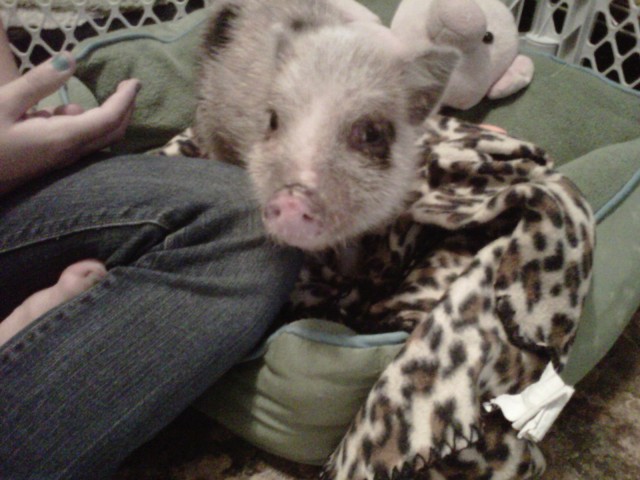 PBP and hiccups
Question
Hi!! Im new to the forum, I hope Im as
PBP and hiccups
Question
Hi!! Im new to the forum, I hope Im as
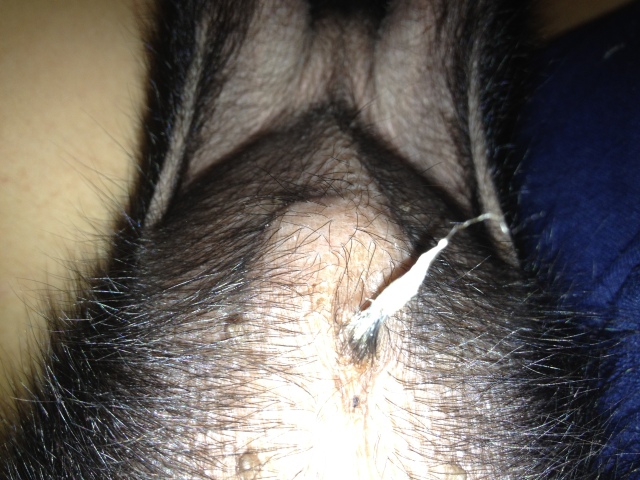 Secretion in my pigs penis
Question
Pig
I have notice that my pig of 5 mont
Secretion in my pigs penis
Question
Pig
I have notice that my pig of 5 mont
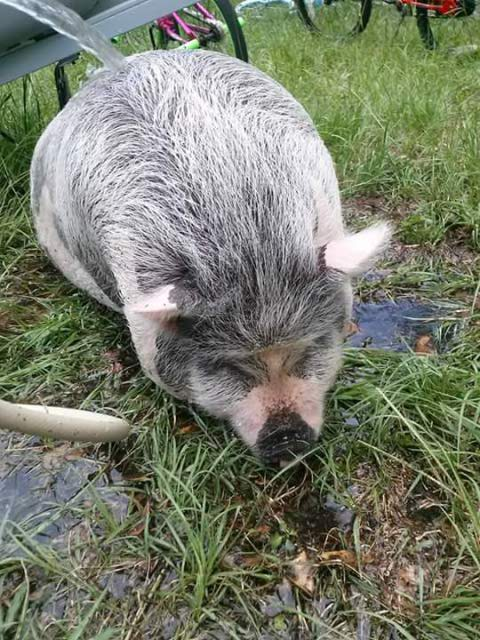 recent licking/biting/kissing/chasing
Question
Bacon
My husband and i were given a rat
recent licking/biting/kissing/chasing
Question
Bacon
My husband and i were given a rat
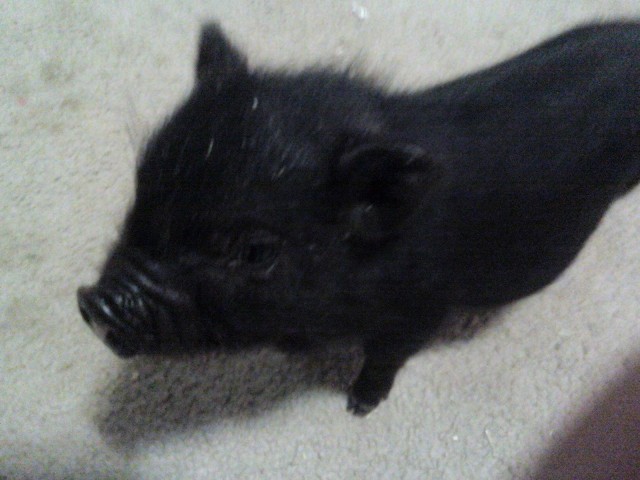 3 1/2 wk pbp
QuestionQUESTION: I am the proud owner of a healthy (sa
3 1/2 wk pbp
QuestionQUESTION: I am the proud owner of a healthy (sa
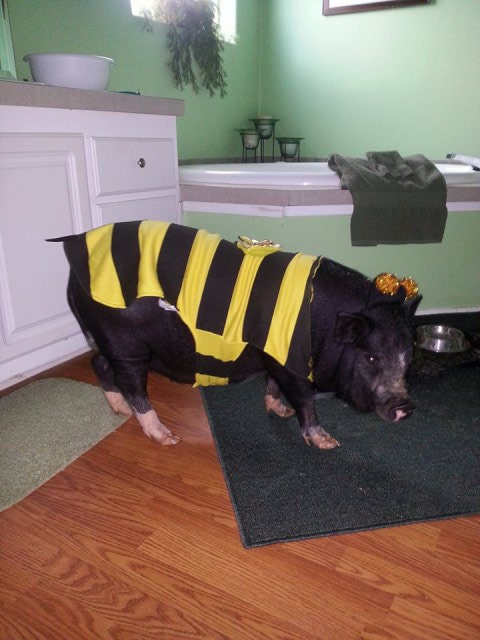 Possible injury
Question
Ellie Mae
I have a 5 month old, female
Possible injury
Question
Ellie Mae
I have a 5 month old, female